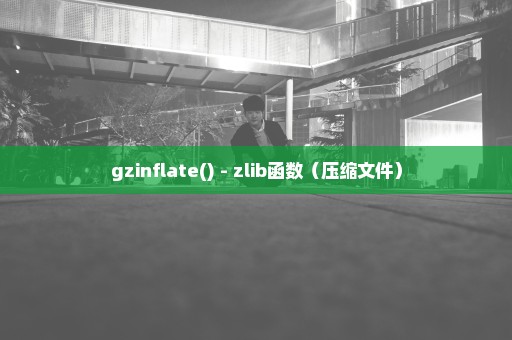gzinflate() - zlib函数(压缩文件)
gzinflate()
(PHP 4 >= 4.0.4, PHP 5, PHP 7)
Inflate a deflated string
说明
gzinflate(string $data[,int $length= 0]): stringThis function inflates a deflated string.
参数
$dataThe data compressed by gzdeflate().
$lengthThe maximum length of data to decode.
返回值

The original uncompressed data or FALSE on error.
The function will return an error if the uncompressed data is more than 32768 times the length of the compressed input$dataor more than the optional parameter$length.
范例
gzinflate() example
参见
gzdeflate()Deflate a stringgzcompress()Compress a stringgzuncompress()Uncompress a compressed stringgzencode()Create a gzip compressed string
To decode / uncompress the received HTTP POST data in PHP code, request data coming from Java / Android application via HTTP POST GZIP / DEFLATE compressed format
1) Data sent from Java Android app to PHP using DeflaterOutputStream java class and received in PHP as shown below
echo gzinflate( substr($HTTP_RAW_POST_DATA,2,-4) ) . PHP_EOL . PHP_EOL;
2) Data sent from Java Android app to PHP using GZIPOutputStream java class and received in PHP code as shown below
echo gzinflate( substr($HTTP_RAW_POST_DATA,10,-8) ) . PHP_EOL . PHP_EOL;
From Java Android side (API level 10+), data being sent in DEFLATE compressed format
String body = "Lorem ipsum shizzle ma nizle";
URL url = new URL("http://www.url.com/postthisdata.php");
URLConnection conn = url.openConnection();
conn.setDoOutput(true);
conn.setRequestProperty("Content-encoding", "deflate");
conn.setRequestProperty("Content-type", "application/octet-stream");
DeflaterOutputStream dos = new DeflaterOutputStream(
conn.getOutputStream());
dos.write(body.getBytes());
dos.flush();
dos.close();
BufferedReader in = new BufferedReader(new InputStreamReader(
conn.getInputStream()));
String decodedString = "";
while ((decodedString = in.readLine()) != null) {
Log.e("dump",decodedString);
}
in.close();
On PHP side (v 5.3.1), code for decompressing this DEFLATE data will be
echo substr($HTTP_RAW_POST_DATA,2,-4);
From Java Android side (API level 10+), data being sent in GZIP compressed format
String body1 = "Lorem ipsum shizzle ma nizle";
URL url1 = new URL("http://www.url.com/postthisdata.php");
URLConnection conn1 = url1.openConnection();
conn1.setDoOutput(true);
conn1.setRequestProperty("Content-encoding", "gzip");
conn1.setRequestProperty("Content-type", "application/octet-stream");
GZIPOutputStream dos1 = new GZIPOutputStream(conn1.getOutputStream());
dos1.write(body1.getBytes());
dos1.flush();
dos1.close();
BufferedReader in1 = new BufferedReader(new InputStreamReader(
conn1.getInputStream()));
String decodedString1 = "";
while ((decodedString1 = in1.readLine()) != null) {
Log.e("dump",decodedString1);
}
in1.close();
On PHP side (v 5.3.1), code for decompressing this GZIP data will be
echo substr($HTTP_RAW_POST_DATA,10,-8);
Useful PHP code for printing out compressed data using all available formats.
$data = "Lorem ipsum shizzle ma nizle";
echo "\n\n\n";
for($i=-1;$i
Enjoy!When retrieving mod_gzip'ed content and using gzinflate() to decode the data, be sure to strip the first 10 chars from the retrieved content.
Take care when using the optional second parameter $length! In our tests -at least in certain situations- we were unable to determine the actual use of this parameter, plus, it lead to the script either being unable to inflate compressed data or crash due to memory-problems. Example: When trying to inflate the compressed data from a website, we were literally unable to find a value (other than 0) for $length in order to make gzinflate work... while without the second parameter (or setting it to 0) gzinflate worked like a charm: In short: We were unable to determine the actual use of the second parameter in certain situations. Be careful with using the second parameter $length!
alternative, with detection for optional filename header
And when retrieving mod_deflate gzip'ed content and using gzinflate() to decode the data, be sure to strip the first 11 chars from the retrieved content.
Some gz string strip header and return inflated It actualy processes some first member of the gz See rfc1952 at http://www.faqs.org/rfcs/rfc1952.html for more details and improvment as gzdecode
The code below illustrates usage of the second parameter, in particular to protect against fatal out-of-memory errors. It outputs: 1000000 1000000 error Tested with PHP 5.3 on 32bit Linux.
This can be used to inflate streams compressed by the Java class java.util.zip.Deflater but you must strip the first 2 bytes off it. ( much like the above comment )
鹏仔微信 15129739599 鹏仔QQ344225443 鹏仔前端 pjxi.com 共享博客 sharedbk.com
免责声明:我们致力于保护作者版权,注重分享,当前被刊用文章因无法核实真实出处,未能及时与作者取得联系,或有版权异议的,请联系管理员,我们会立即处理! 部分文章是来自自研大数据AI进行生成,内容摘自(百度百科,百度知道,头条百科,中国民法典,刑法,牛津词典,新华词典,汉语词典,国家院校,科普平台)等数据,内容仅供学习参考,不准确地方联系删除处理!邮箱:344225443@qq.com)
图片声明:本站部分配图来自网络。本站只作为美观性配图使用,无任何非法侵犯第三方意图,一切解释权归图片著作权方,本站不承担任何责任。如有恶意碰瓷者,必当奉陪到底严惩不贷!
内容声明:本文中引用的各种信息及资料(包括但不限于文字、数据、图表及超链接等)均来源于该信息及资料的相关主体(包括但不限于公司、媒体、协会等机构)的官方网站或公开发表的信息。部分内容参考包括:(百度百科,百度知道,头条百科,中国民法典,刑法,牛津词典,新华词典,汉语词典,国家院校,科普平台)等数据,内容仅供参考使用,不准确地方联系删除处理!本站为非盈利性质站点,本着为中国教育事业出一份力,发布内容不收取任何费用也不接任何广告!)
 百科狗
百科狗



